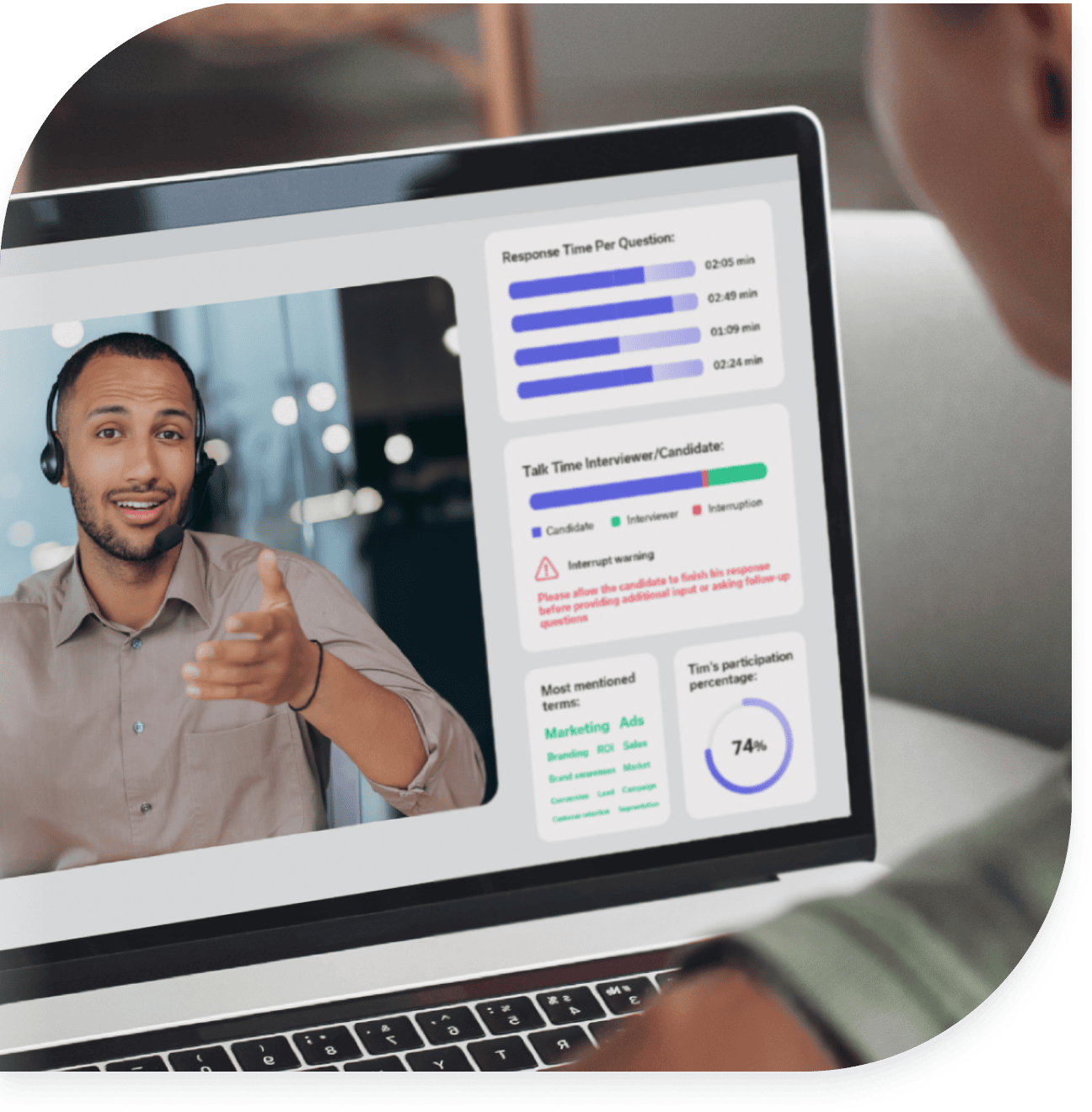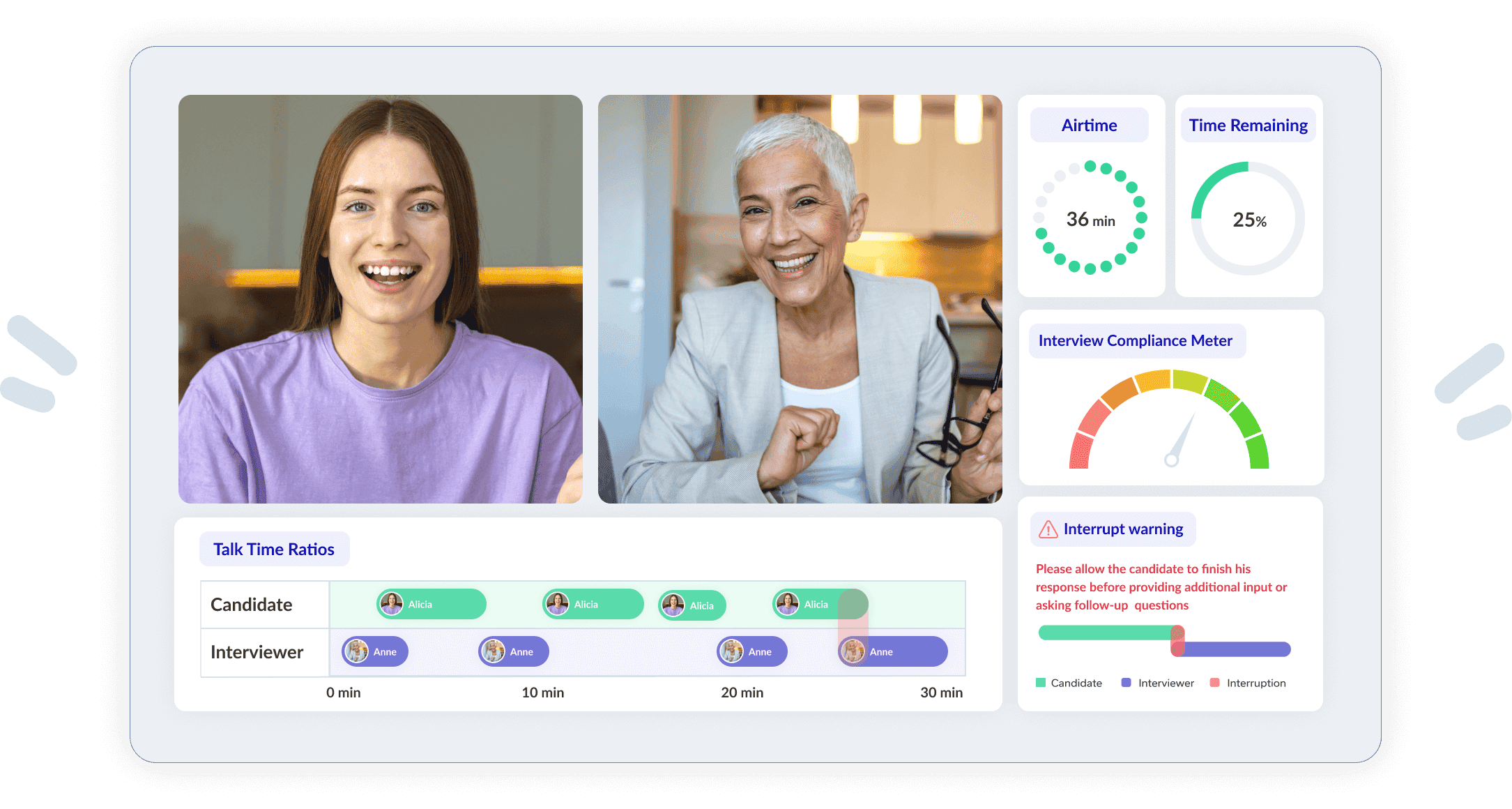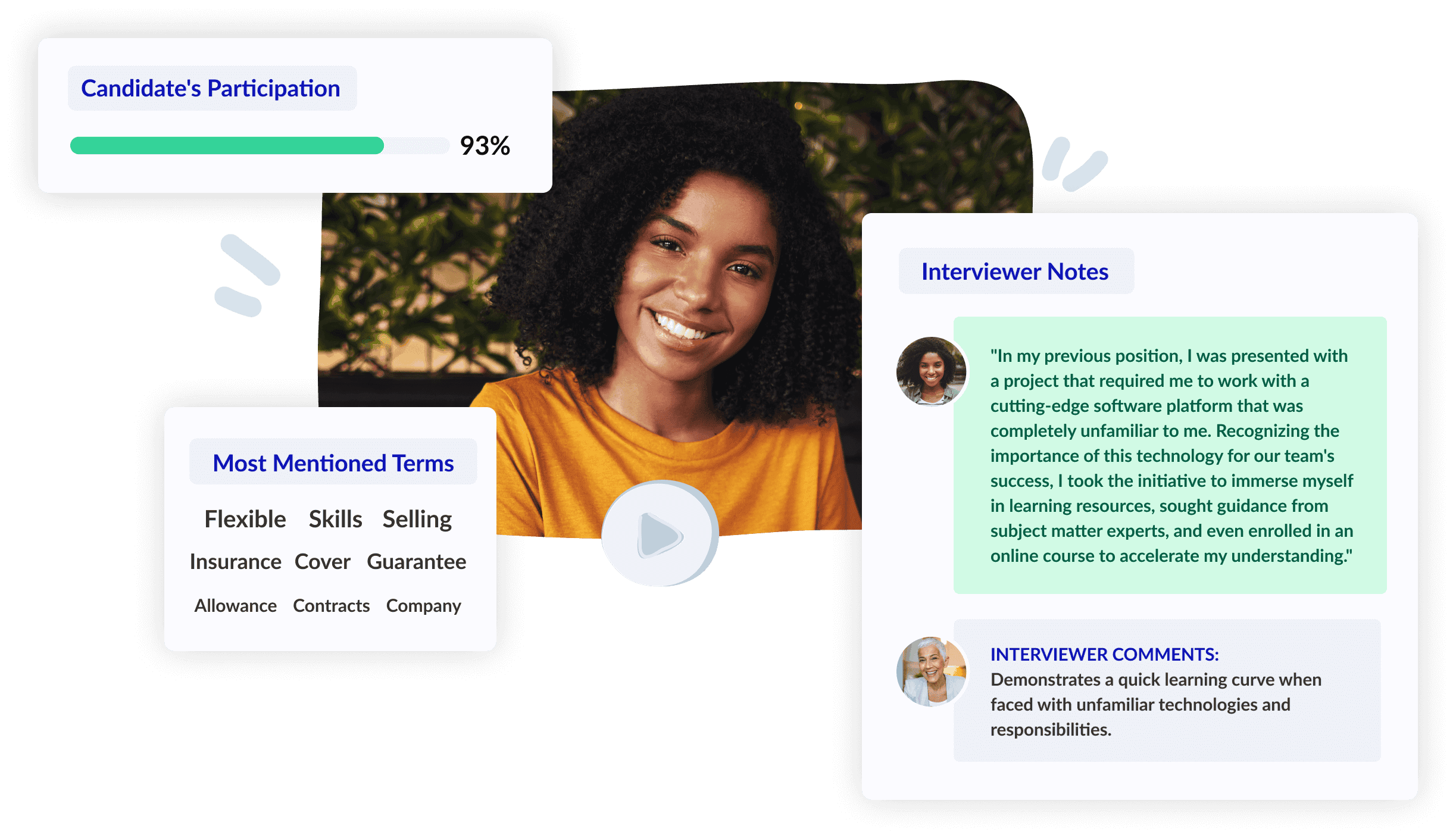
Ethical AI and Recruitment
While AI tools might be tested, not all are checked for ethics. How can you ensure that your hiring tools are not biased?

Interview intelligence optimizes a human-first structured interview process with artificial intelligence (AI). AI assists in evidence-based planning, coordination, and moderation for an effective and compliant interview process. The goal is to identify the most proficient predictors of job performance specific to the role and organization and elevate human-led decisions.
Interview intelligence uses artificial intelligence (AI), machine learning (ML), and automation to help recruiters, talent acquisition teams, and human resource professionals conduct structured interviews. By analyzing interview data, interview intelligence gives the human resources department valuable information to streamline and enhance the full interview process – including components such as interview scheduling and interviewer feedback.

Learn about the benefits of structured interviewing
Because interview intelligence uses AI, industry-leading experts highly recommend implementing a framework to ensure ethical AI use and responsible application.
An ethical and responsible use of interview intelligence incorporates these key considerations. Establish these four pillars when implementing interview intelligence.
Interview intelligence is human-first. It makes the process better for both candidates and interviewers, but it needs to be led by people. IO psychologists pre-validate all interview content before use and ensure decision-making always lies in human hands. Human oversight is maintained to monitor the potential for AI to influence decision-makers and maintain ethical accountability.
AI, ML, and automation are used to execute administrative tasks, plan interviews, keep records, analyze processes, audit questions for bias potential, provide interviewer feedback, give real-time coaching to interviewers, and conduct compliance checks. The key to an ethical interview intelligence program is defining the role AI plays in the process. Ideally, it is an AI-augmented process that organizes, analyzes, and distributes information for human decision-making in a structured interview process.
Interview intelligence provides a unique opportunity to collect and analyze data based on an organization’s own process. This data can be used to improve an organization’s ability to conduct interviews and produce desirable outcomes. Here are some ways interview intelligence can continuously improve the interview process:
Interview intelligence leverages AI to identify patterns in applicant evaluations that may indicate opportunities to improve the inclusivity of your interview and rating processes. It can provide real-time prompts related to talk time distribution and interruption rates, so interviewers can change their approach to level the playing field and improve candidate experience.
Interview intelligence also provides data on panel composition and areas of over or underrepresentation in the hiring process so you’ll know if your organization is meeting your diversity and inclusion goals in these areas. With AI-augmented insights, you can take steps to improve representation throughout your process and ensure candidates have an equitable interview experience.
Interview intelligence can support accessibility accommodations
Interview intelligence can help interviewers offer accessibility accommodations without compromising the consistency of the structured interview process. Interview intelligence tools that offer real-time feedback can suggest accommodations for candidates mid-interview if the interviewer learns of a barrier to accessibility.
Interview intelligence engines can also rephrase or reorganize questions to be more easily understood by the candidate while maintaining the predefined parameters set prior to the interview process.

Interview intelligence can provide actionable insights from an organization’s own data to improve the following aspects of the interview process:
Validity of job interviews
The information you gather in an employee’s initial interview can be key to increasing the quality of hires. You can follow an employee’s journey from interview performance through to job performance and identify key competencies that lead to high performance.
Interview question validity
Some interview questions are connected to better hiring decisions, and some don’t add value to the interview process. Interview intelligence allows you to analyze questions to see if they are associated with performance in the role and at the organization.
Interviewer performance
AI tools can provide feedback in real time, offering an alternative point of view, fostering awareness of interviewer behaviors, and identifying specific techniques to encourage candidate engagement. Interview intelligence can identify training opportunities for interviewers based on talk times, interruptions, interview dominance, non-compliance, and more. This collaboration helps identify top performers and elevate interview competency, which is critical to success.

If you are using pre-recorded interviews, you can still apply interview intelligence. Here are some ways it can enhance the process:
Objective insights
It can be tough for humans to perceive their own behavior objectively, even if they are highly self-aware. This is where interview intelligence is uniquely helpful. Once the rater is finished, the AI provides data-backed insights about their ratings. As the AI gathers data over time, it can assess rater tendencies so raters can improve their performance.
Bias mitigation
By performing sensitivity audits on questions, interview intelligence supports raters in the moment by identifying areas with a potential risk of bias. When raters review pre-recorded interviews, AI can prompt them with context to help mitigate these instances.
Transcriptions
In addition to being able to rewatch the interview an unlimited number of times, interview intelligence can transcribe pre-recorded interviews, saving raters time, and offering more options for review. Having a transcription also allows raters to search for specific words or phrases easily.
The value of data is what you do with it. The next step is taking action to improve your structured interview process using AI-generated data points.
Here are the primary ways to improve your interview process using interview intelligence:
A 2020 study in Business Horizons discusses how AI-enabled recruiting systems went from nice-to-have to necessary due to the rising value of human capital:
“Firms and executives that do not quickly embrace AI-enabled recruiting may find that the 60%–80% of their employees whom they considered engaged based on internal surveys are vulnerable to targeted, proactive, and customized outreach efforts by competitors.”
J. Stewart Black & Patrick Van Esch,
Business Horizons, vol.64, issue 2
The role of AI in recruiting is only getting bigger — don’t get left behind.
Coaching interviewers to improve using AI-generated insights is an excellent professional development opportunity that also strengthens the interview process.
Interview intelligence elevates transparency throughout the process. AI-powered feedback about performance creates awareness so interviewers can correct themselves. If things start heading in a troublesome direction or too far from pre-set parameters, it can caution and coach the interviewer back into alignment with the process. Interview intelligence also allows the HR team to monitor interviewers and produce individualized training plans to address areas of improvement. Having access to this data in real time creates opportunities for immediate corrections and long-term growth.
Guidelines for ethical AI use
How you incorporate AI in your hiring process directly impacts the ethical and legal implications.
The easiest way to ensure you’re ethically incorporating AI into your process is to use it to promote best practices and improve your hiring process, not to assess, screen or select candidates.
Talent intelligence uses AI, ML, and automation to gather insights about candidates from their interviews, then collects and analyzes the data to discover talent patterns and make hiring decisions. The best example of this is AI-enabled software that analyzes video interviews, assessing the candidate’s body language, facial expressions, word choices, and tone of voice.
Interview intelligence does not evaluate candidates using AI. In fact, some experts question the ethics and validity of analyzing candidates in this way. The only people who are assessed using interview intelligence are the interviewers.
Recruiting intelligence uses AI-powered candidate assessment tools to identify and attract the best candidates for a given role or organization. An example would be using chatbots to screen candidates for a specific job. While using AI for tasks like screening may drive efficiency, leading experts suggest there is a significant risk when AI is making unchecked decisions.
It’s often difficult to understand the exact parameters around how or why candidates are being filtered out by the system — qualified candidates could be getting filtered out for reasons that are not relevant to job performance, introducing bias into the process.
The focus of interview intelligence is helping humans optimize the assessment and selection process. Recruiting intelligence is concerned with sourcing quality candidates, whereas interview intelligence creates a process that identifies quality candidates.
When used correctly, interview intelligence has several advantages:
Interview intelligence plugs AI, ML, and automation into a standardized interview process to provide data and reports. Some solutions contain advanced evolutionary AI that can also provide real-time assistance, such as interview coaching.
If you have hiring software and you’re not taking advantage of interview intelligence, it’s a missed opportunity to modernize and optimize your hiring process. Interview intelligence can unlock a new level of transparency, feedback, and compliance, allowing the hiring team to analyze and improve the process.
If your employer uses a structured interview methodology, sticking to the process as much as possible will help you conduct compliant interviews. The hiring team should also ensure you have all the training you need, including up-to-date corporate anti-bias training, to succeed.
Part of being a better interviewer is also getting quality feedback on your performance. Learning from your mistakes through interview coaching is part of being a good interviewer, and advanced interview intelligence tools can uniquely allow you to do this in real time.
Modernize your hiring process with expert insights and advice.